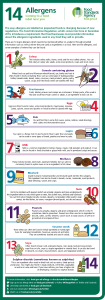Restaurants step up preparations ahead of EU allergen labelling law

Basically expanding regulations that have been in place for packaged food for over a decade, the new law will require the whole foodservice sector, including restaurants, pubs and cafes, to track all the allergenic ingredients that go into their dishes. The allergens included in the EU’s top 14 are celery, cereal containing gluten, crustaceans, eggs, fish, lupin, milk, molluscs, mustard, nuts, peanuts, sesame seeds, soya and sulphur dioxide.
In an interview with training firm Allergy Aware Kitchen, Sue Hattersley, head of allergy at the Food Standards Agency (FSA), explained: “The enforceable section of the regulations are knowing what is in your products, where do you keep the information recording what you have bought from suppliers and how their ingredients information is disseminated. Enforcement officers could ask a member of staff to let them know where the allergy information is for a specific product.”
But although the implementation of the regulations is fast approaching, the FSA has yet to publish its guidance on the topic, and some dining venues are still unaware of the upcoming changes.
Liz Allan, director of Allergy Aware Kitchen, told BigHospitality: “People are worried because they’ve not had the dissemination of information they expected. If they haven’t put the processes in place before December, that will be a big issue, but they need to know about it in the first place. Environmental health officers are being trained but it’s about getting the word out to the industry.”
Gluten-free craze
One thing that seems to be gaining popularity on the restaurant scene is the gluten-free option on menus. A growing number of venues are showing creativity and revisiting classic dishes with a gluten-free twist to cater to the growing number of customers that avoid the protein for medical or lifestyle reasons.
A report released today by Coeliac UK in the context of Coeliac Awareness Week has revealed that more and more people are being diagnosed with the disorder. The National Institute of Health and Care Excellence (NICE) previously estimated that only 10–15 per cent of those with the disease had been diagnosed, but the latest research from the University of Nottingham has shown that the level of diagnosis has increased to 24 per cent. However, the charity warned that three quarters of people with coeliac disease remain undiagnosed.Previous research by Coeliac UK showed 11 per cent of the UK population avoids gluten for medical or lifestyle reasons and a survey by gluten-free food supplier Almondy found that a further 71 per cent is guided by the needs of someone with a gluten intolerance when dining out.
Andrew Ely, managing director of Almondy, commented: “Gluten-free is a market caterers can no longer afford to ignore.”
The gluten-free sector is currently worth about £136m, up 229 per cent in ten years, and is forecast to be worth £519m by 2016 as more people are being diagnosed with gluten intolerance or coeliac disease, according to Kantar World Panel. For that reason, getting on the gluten-free wave is turning into more of a profit-oriented decision than one prompted by food standards regulations – and some believe that’s also how restaurants should approach the broader top 14 allergen law.
Financial benefit
Interestingly, research carried out by the FreeFrom Awards revealed that only 20 per cent of people with allergies or intolerances were wishing for greater choice as their number one priority. Instead, 60 per cent wanted clear, reliable and transparent information about possible allergens in their food – suggesting that this is the area restaurants should focus their efforts on.
While implementing the right recording processes and training staff about allergens will be time-consuming and potentially expensive, the long-term benefits of such a change in business model make it worthwhile.
“People think regulations are a pain, but if they do it in the right way, people with allergies will be loyal customers, because they appreciate how difficult it can be. They will spread the word, and come back and eat there,” Allan added.
The main thing restaurateurs should focus on is paperwork. They can do that in a traditional way – pen and paper and spreadsheets for example – or they can resort to menu engineering companies, which can also help them look at the profitability of their dishes.
Ben Hood, CEO of kitchen technology firm Fourth Hospitality, explained: “The challenge for operators is to navigate the implementation of this legislation with as little complication and expense as possible. The associated costs are potentially substantial, given that the legislation will require operators to invest money, time and resource into (for example) due diligence with suppliers, staff training, creating in-venue signs, changing kitchen and till systems, and menu reprints amongst other factors.
“It is clear that technology in a wider sense has a keen role to play. Low-cost software is available, that will do the heavy lifting in calculating nutritional values and the presence of allergens in dishes and dish components. Such systems can be owned centrally by a multi-site company but be made available to each restaurant via PC, tablet or smartphone. The contrast with manual calculations and processes is stark.”
In terms of display, the legislation gives several options according to the type of venue. It could be put on a menu, with the allergy information under each item; a sandwich bar could put it on the tickets if the sandwiches were wrapped on site; some restaurants could have a folder near the till which will give allergy information per dish; but all foodservice organisations will need to supply recipe information regarding where the allergens are within the dishes.
Staff training
On top of getting the administrative processes in place, foodservice operators must also think about training, as staff will be expected to be able to answer questions regarding allergen and nutrition enquiries, or to provide customers with more information. The Eating Out survey from FreeFrom Awards also pointed out that only 17 per cent of diners with allergies or intolerances trusted front-of-house staff to give them reliable information about allergens.
For that Allan recommended learning about the basics in the public domain, and defining priorities according to your budget. “Assess your staff, and even if you can’t train everybody up to a high level, I would suggest that for every shift you have at least two foodservice people who have that knowledge. Decide who they’re going to be, and make them the ‘allergy gurus’ of your restaurant,” she pointed out, adding that everyone on the floor should at least know where to find the venue’s back-up information about allergens.
“They need to have some training, and you can get a lot of information for free, but if you take it seriously and want to make some money from this, you should go for proper training. Processes are number one, but you can’t have processes without knowledge, and training will actually teach you about the processes.”
Time is ticking
Although the legislation doesn’t come into force until December, work should start now to ensure compliance, and according to a Twitter survey conducted by BigHospitality, businesses are taking different approaches, with labelling and supplier information as high priorities.
The Forum of Private Business suggested the following key steps to make sure foodservice businesses are ready ahead of December:
- Monitoring all ingredients used in their food, and categorise them based on allergens
- Ensure that their suppliers notify them of any allergy changes
- Review each menu item to ensure that all allergens are described
- Store allergen-containing ingredients away from non-allergen-containing ingredients
- Minimize the risk of cross contamination by using separate areas for non-allergen containing dishes
- Ensure all staff are allergen aware.
Chefs should also expand hygiene measures in the kitchen to avoid cross-contamination of allergens – something that, though not yet regulated, is being looked at by food standards authorities.



























